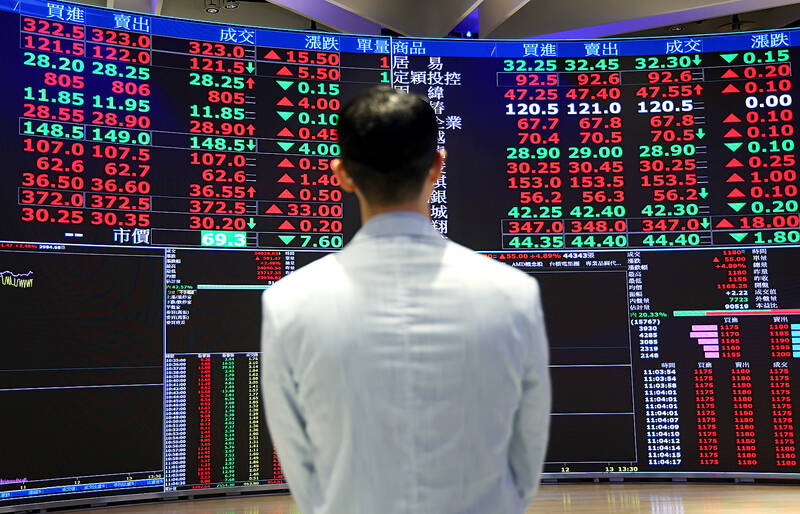Shares in Taiwan broke records at the end of yesterday’s session after contract chipmaker Taiwan Semiconductor Manufacturing Co (TSMC, 台積電) hit a fresh closing-high amid enthusiasm toward artificial intelligence (AI) development, dealers said.
The TAIEX ended up 382.67 points, or 1.45 percent, at the day’s high of 26,761.06. Turnover totaled NT$463.09 billion (US$15.22 billion).
“The local main board has repeatedly hit new closing highs in the past few sessions as investors continued to embrace high hopes about AI applications, taking cues from a strong showing in shares of US-based AI chip designer Nvidia Corp,” Hua Nan Securities Co (華南永昌證券) analyst Kevin Su (蘇俊宏) said.

Photo: CNA
“TSMC, again, served as a driver to the TAIEX’s upturn, as the stock, which appeared cheaper in valuation than Nvidia shares, kept playing catch-up,” Su said, referring to TSMC’s price-to-earnings multiple of below 25, compared with Nvidia’s more than 30.
TSMC shares rose 2.56 percent to close at the day’s high of NT$1,400, contributing about 280 points to the TAIEX’s rise and sending the bellwether electronics index up 2.08 percent.
TSMC’s buying spread to other large-cap semiconductor stocks, with smartphone integrate circuit designer MediaTek Inc (聯發科) rising 3.12 percent to end at NT$1,320. Memory chip suppliers continued to benefit from product price hikes as Winbond Electronics Corp (華邦電) soared 7.78 percent to close at NT$38.80 and Nanya Technology Corp (南亞科技) gained 4.14 percent to end at NT$83.
The AI frenzy also boosted other hardware suppliers, Su said.
Quanta Computer Inc (廣達), an AI server maker, rose 2.04 percent to close at NT$300, and rival Wistron Corp (緯創) added 2.68 percent to end at NT$153.50. iPhone assembler and AI server supplier Hon Hai Precision Industry Co (鴻海精密) underperformed its counterparts, up only 0.44 percent to close at NT$226.50.
“Despite the TAIEX’s solid gains, non-tech stocks largely moved in weakness as recent furlough reports showed the old economy industry fell victim to the US tariffs,” Su said.
Formosa Plastics Corp (台塑) lost 2.27 percent to close at NT$36.65, and Formosa Chemicals & Fibre Corp (台化) shed 3 percent to end at NT$27.50. China Steel Corp (中鋼), the largest steel maker in Taiwan, dropped 1.04 percent to close at NT $19, while Chung Hung Steel Corp (中鴻鋼鐵) ended unchanged at NT$15.50.
On profit taking from its recent strong gains, Teco Electric & Machinery Co (東元電機) lost 0.87 percent to close at NT$113.50, but Fortune Electric Co (華城電機) rose 1.6 percent to end at NT$572.
In the financial sector, which lost 0.63 percent, Fubon Financial Holding Co (富邦金控) fell 1.03 percent to close at NT$86.50, while Cathay Financial Holding Co (國泰金控) ended unchanged at NT$65.
“Washington will release the September nonfarm payroll data today, which is expected to provide more clues about how the Federal Reserve will carry out its rate cut cycle,” Su said.

Nvidia Corp chief executive officer Jensen Huang (黃仁勳) on Monday introduced the company’s latest supercomputer platform, featuring six new chips made by Taiwan Semiconductor Manufacturing Co (TSMC, 台積電), saying that it is now “in full production.” “If Vera Rubin is going to be in time for this year, it must be in production by now, and so, today I can tell you that Vera Rubin is in full production,” Huang said during his keynote speech at CES in Las Vegas. The rollout of six concurrent chips for Vera Rubin — the company’s next-generation artificial intelligence (AI) computing platform — marks a strategic

REVENUE PERFORMANCE: Cloud and network products, and electronic components saw strong increases, while smart consumer electronics and computing products fell Hon Hai Precision Industry Co (鴻海精密) yesterday posted 26.51 percent quarterly growth in revenue for last quarter to NT$2.6 trillion (US$82.44 billion), the strongest on record for the period and above expectations, but the company forecast a slight revenue dip this quarter due to seasonal factors. On an annual basis, revenue last quarter grew 22.07 percent, the company said. Analysts on average estimated about NT$2.4 trillion increase. Hon Hai, which assembles servers for Nvidia Corp and iPhones for Apple Inc, is expanding its capacity in the US, adding artificial intelligence (AI) server production in Wisconsin and Texas, where it operates established campuses. This

US President Donald Trump on Friday blocked US photonics firm HieFo Corp’s US$3 million acquisition of assets in New Jersey-based aerospace and defense specialist Emcore Corp, citing national security and China-related concerns. In an order released by the White House, Trump said HieFo was “controlled by a citizen of the People’s Republic of China” and that its 2024 acquisition of Emcore’s businesses led the US president to believe that it might “take action that threatens to impair the national security of the United States.” The order did not name the person or detail Trump’s concerns. “The Transaction is hereby prohibited,”

Garment maker Makalot Industrial Co (聚陽) yesterday reported lower-than-expected fourth-quarter revenue of NT$7.93 billion (US$251.44 million), down 9.48 percent from NT$8.76 billion a year earlier. On a quarterly basis, revenue fell 10.83 percent from NT$8.89 billion, company data showed. The figure was also lower than market expectations of NT$8.05 billion, according to data compiled by Yuanta Securities Investment and Consulting Co (元大投顧), which had projected NT$8.22 billion. Makalot’s revenue this quarter would likely increase by a mid-teens percentage as the industry is entering its high season, Yuanta said. Overall, Makalot’s revenue last year totaled NT$34.43 billion, down 3.08 percent from its record NT$35.52